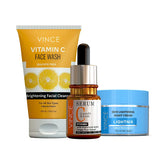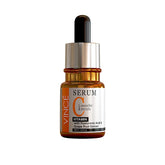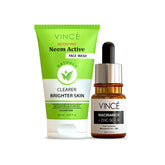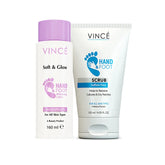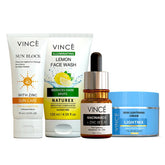Dry Patches on Face: Causes, Treatments, and Prevention Tips

Dry patches on the face are a gentle reminder to nourish your skin where it is lacking. Dry flaky skin on the face quietly signals the underlying concern, ranging from Eczema dry skin patches to psoriasis on the face.
Hormonal skin changes play a significant role in the appearance of dry patches on the face, while on other occasions, it's labeled as environmental skin dryness.
However, irrespective of the causes of dry skin, the first step that ensures softness and radiance is moisturizing dry skin with a balanced formula for hydration. This article will enlighten you with valuable insights on how to treat dry skin, outlining everything from skincare for dry patches to essential tips for preventing skin dryness.
So, if the dry patches on your face become overly frustrating for you, delve deeper into this comprehensive guide covering all aspects of skin hydration and healing.
Dry Flaky Skin on the Face
Dry patches on the face refer to areas on the skin that feel tight and rough, leading to peeling and cracking. Some other common symptoms involve dehydrated skin lacking hydration, irritation, redness, and uncomfortable tightness, especially after facial cleansing.
Dry patches on the face clearly indicate that your skin's craving for hydration and well-needed moisture with a compromised natural barrier. It ultimately weakens your skin, making it more susceptible to further irritation and infections, with various internal and external factors like harsh skincare products or underlying health conditions becoming even more damaging.
In the long run, it also affects overall skin appearance, leading to dullness, uneven texture and tone.
Important Link: How To Treat Dry Skin in UAE
Causes of Dry Skin
Once you experience dry patches on your face, there can be several culprits acting as contributing factors. Let’s have a look at the primary causes of dry skin:
Eczema Dry Skin Patches
Eczema is a common skin condition often inherited where an individual experiences symptoms like red, itchy, or dry patches on the face that can turn painful at times. Eczema dry skin patches shade in varying colors based on skin tones from reddish brown to greyish brown, and they crust over or peel on scratching.

Psoriasis on Face
Psoriasis is an inflammatory skin condition that disrupts the normal skin cell division by speeding up the process, causing them to multiply too quickly. It ultimately develops stubbornly thick, raised, scaly, and dry patches on the face with clear boundaries usually prominent near the nose, forehead, or hairline.
Although the real cause remains a mystery, a few triggers may result in flare-ups, including smoking, stress, medication, infections, and skin injuries.
Hormonal Skin Changes
Individuals often observe hormonal fluctuations for varying reasons, especially during pregnancy and menopause. This change leads to dehydrated skin, less sebum production, and increased skin sensitivity, which leads to visible dry patches on the face.
Environmental Skin Dryness
We cannot save our skin from harsh environmental factors, including biting cold winds, low humidity, indoor heating systems, and scorching sun.
Our delicate skin battling all these factors gets affected quickly if our skincare routine is not up to the challenge against this ongoing battle. As a result, skin loses moisture, leading to a dull, flaky, and rough appearance.
Other Causes of Dry Patches on the Face
Some other common causes of dry patches on the face involve:
- Lifestyle factors, including dehydration, stress, smoking, and nutritional deficiency, particularly in calcium, vitamin D, or vitamin E
- Harsh skincare products and not consistently using gentle, hydrating moisturizer
Important Link: Dry Skin vs Dehydrated Skin: Know the Difference
How to Treat Dry Skin: Effective Solutions for Dry Patches on Face
If dry patches have made their way to your face, we have a way forward for you to effectively treat them with simple yet effective solutions.
Let’s have a look at the simple solution that demands consistency but offers immediate skin healing and rejuvenation. In case of dry patches on the face due to eczema or psoriasis, along with practicing the following remedies and tips, it’s always best to consult a dermatologist to track underlying allergies and OTC medications.
Moisturizing Dry Skin
Whether you are combating dry patches on the face or overall dryness, the first and most effective step is adding a moisturizer to your skincare routine and regularly applying it in the morning and evening.
The most common ingredient that helps you experience noticeable benefits and lasting impact is a moisturizer crafted with hyaluronic acid, shea butter, and glycerin.
Following is a list of top-recommended moisturizers well-known to seal in moisture and strengthen natural barriers to prevent dry patches:
Perfect 30's Cream
It is an advanced formula that suits every skin type as it is infused with magical hydrating ingredients, hyaluronic acid, and shea butter.
The best part is optimal hydration and strengthening the skin barrier, which are just the beginning – its benefits go beyond tackling aging signs, hyperpigmentation, and much more.

Multiple Repairing Cream
Hyaluronic acid-infused cream penetrates deeper to nourish and repair the dry patches on the face and also smooth out wrinkles and fine lines that often appear on dry and dehydrated skin.
Skincare for Dry Patches
Following are a few more skincare products ideal for eliminating the dry patches on the face:
Gentle and Hydrating Cleanser
Cleansers are a blessing that can quickly turn into a burden if not chosen wisely, especially when dealing with dry patches on the face. Many traditional cleansers, along with impurities, strip off well-needed moisture, leaving skin far drier.
Therefore, make the best decision by starting your skincare routine with a gentle and hydrating Aloe Vera Face Wash. The presence of aloe vera makes it an even better option, as its soothing effect also helps relieve eczema.

Hyaluronic Acid Serum
Hyaluronic acid deserves a fixed spot in your skincare for dry patches due to its exceptional hydrating and barrier repair power. Its delicate touch makes it suitable for all skin types, offering a soothing effect that effectively calms your skin.

Sunblock
UV rays worsen dry patches on the face by stripping moisture, compromising natural barrier, and triggering eczema and psoriasis, making sunblock an unavoidable accessory.
Prevention Tips for Dry Patches on the Face
Respect the harsh weather by wearing intensely moisturizing barrier cream during winter, while during summer, stay in shades and reapply sunscreen every 2 hours.
Never incorporate a skincare product into your routine without performing a patch test first. A few adjustments that will make a significant difference:
- Managing stress
- Consuming a balanced diet
- Hydrating your insides
- Using a humidifier
Conclusion
Dry patches on the face are a common and persistent concern that can turn frustrating if left untreated.
Embracing a gentle and hydrating skincare routine for dry patches is the healing your skin deserves with moisturizers, sunblock, and hydrating serums.
With the right care and prevention tips, the radiant confidence will shine through, unburdened by dryness.
Frequently Asked Questions (FAQs)
Q1: What are the common causes of dry patches on the face?
The dry patches on the face can be attributed to multiple causes where common skin conditions like eczema and psoriasis may be at play or hormonal fluctuations, which can ultimately affect the skin’s moisture level. Additional causes involve harsh skincare products, extreme weather conditions, and lifestyle and dietary factors like stress, dehydration, nutritional deficiencies, and smoking.
Q2: How can I prevent dry skin patches during winter?
To tackle dry skin during winter, start with mild cleansers and keep rich and hydrating moisturizers close by, infused with ingredients like hyaluronic acid and shea butter. Avoid hot showers and harsh skincare products that can strip away moisture. Maintain indoor humidity by using a humidifier and never skip applying a sunscreen before stepping out even during colder weather.
Q3: Are dry patches on the face a sign of eczema or psoriasis?
Dry patches on the face can be a sign of eczema or psoriasis, two common skin conditions, or other factors like dehydration, environmental changes, and lifestyle factors may be responsible. Eczema is characterized by red, itchy and peeling patches that can become painful and may even bleed. On the other hand, in psoriasis, one experiences dry patches on the face that appear scaly, thick and well-defined.
Q4: What are the best moisturizers for treating dry flaky skin?
For treating dry skin, select moisturizers infused with hydrating ingredients well-known to strengthen natural barriers, like shea butter, hyaluronic acid and glycerin. For mild dryness, you can go for lotions while selecting intense creams to treat severe dryness. Multiple Repairing Cream is a remarkable moisturizer for skin repair and hydration with additional anti-aging benefits.
Q5: When should I see a dermatologist for dry patches on my face?
Immediately visit a dermatologist if dry patches on your face persist after regular moisturizing and even avoiding harsh skincare products. Especially if they are accompanied by other symptoms like redness, itching, irritation, scaling, spreading - or, in the worst cases, become painful or start bleeding. These symptoms may indicate that you are experiencing an underlying skin condition like eczema or psoriasis that requires medical attention.

 KSA
KSA
